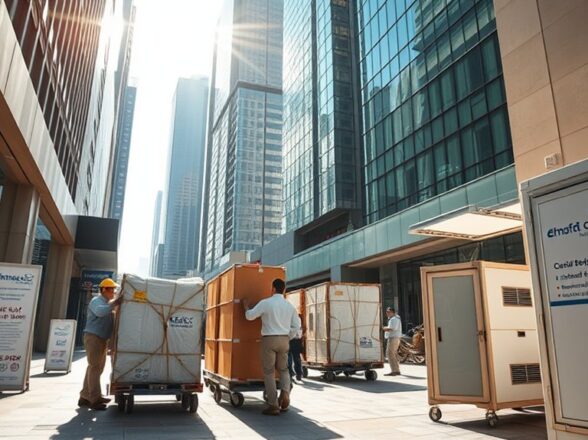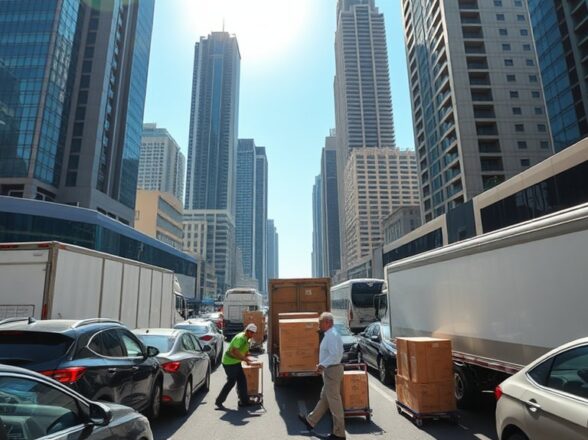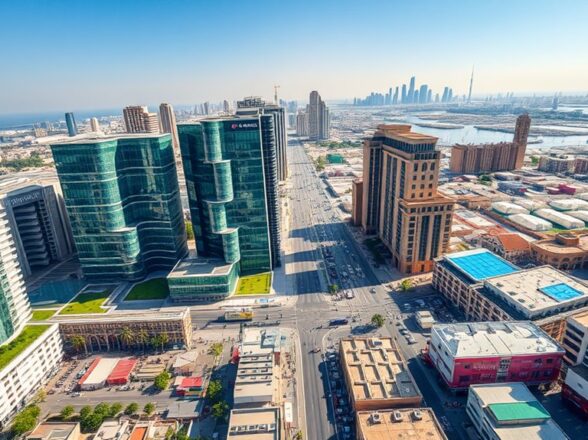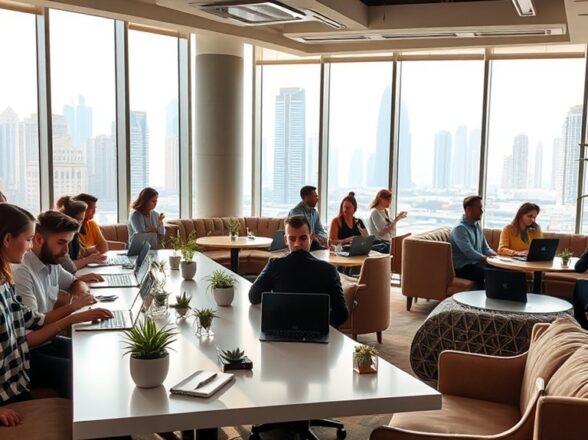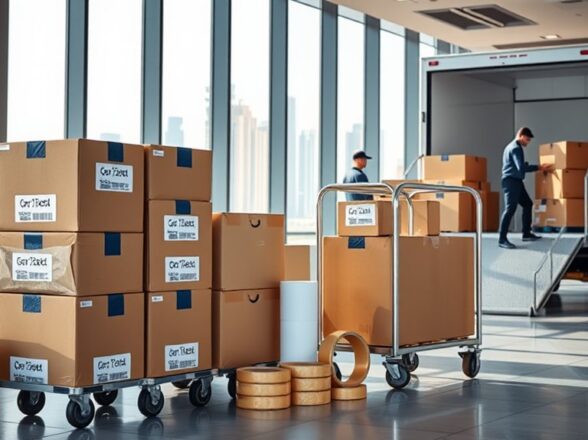How Dubai’s Traffic Patterns Affect Office Relocations: Tips to Plan Ahead
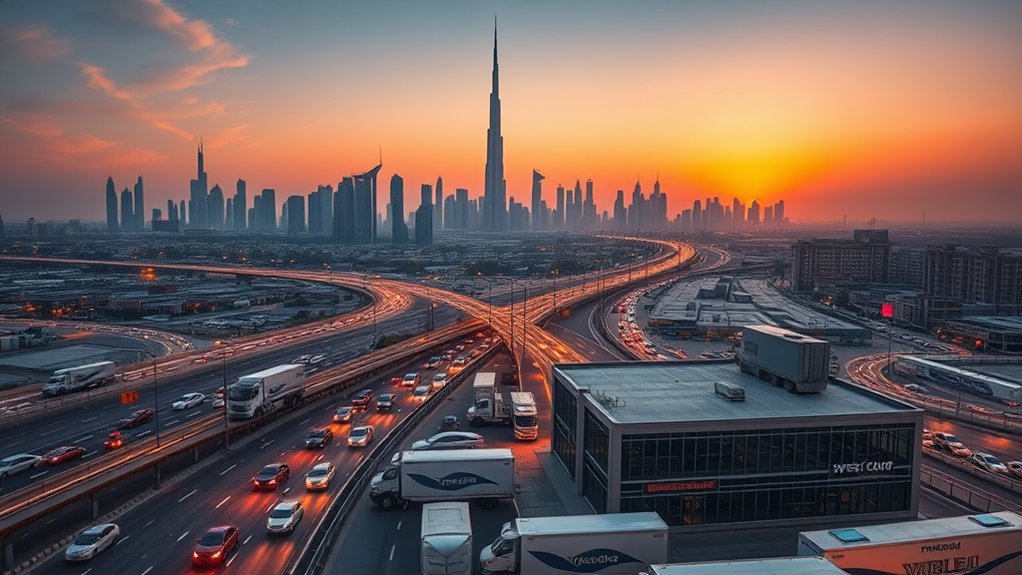
Dubai's traffic patterns can greatly influence your office relocation plans, so planning ahead is essential. Peak traffic hours, from 7 AM to 9 AM and 5 PM to 8 PM, can lead to delays. To guarantee a smoother move, consider scheduling it during off-peak times like early mornings or weekends. Avoid major congested routes, like Sheikh Zayed Road, and use real-time traffic apps for updates. Conducting a pre-move traffic analysis will help you identify potential issues. With thoughtful preparation, you can minimize disruptions and make your shift seamless, and there's so much more you can learn about optimizing your move.
Key Takeaways
- Schedule office relocations during off-peak hours, ideally between 8 PM and 6 AM, to minimize traffic delays.
- Conduct thorough pre-move surveys to assess traffic patterns and identify potential congestion areas before planning the move.
- Utilize alternate routes like Sheikh Mohammed Bin Zayed Road to avoid major traffic on Sheikh Zayed Road and Al Khail Road during peak hours.
- Consider weekend moves (Friday and Saturday) to benefit from lower vehicle density and improved coordination with moving teams.
- Stay updated on real-time traffic conditions using apps to adjust routes and avoid delays during the relocation process.
Understanding Dubai's Traffic Patterns

Understanding Dubai's traffic patterns is essential, especially as the city continues to grow at a rapid pace. With rapid urban development and high urban density, you'll often find significant traffic congestion. Major roadways like Sheikh Zayed Road and Al Khail Road experience peak traffic times, making your commute challenging during busy periods. Inefficient land use and the poor integration of schools and commercial areas into the transportation system further exacerbate this issue.
The relationship between traffic flow, speed, and density is vital for you to grasp. As vehicle density increases, speed and overall flow decrease, leading to more congestion. This means you'll need to plan your office relocation in Dubai carefully to avoid getting stuck in traffic. Relying on personal vehicles often feels necessary due to limited metro service areas, making it harder to navigate the city efficiently. Additionally, hiring professional movers can significantly streamline the moving process and reduce stress.
Interestingly, adopting flexible work policies could help alleviate some of this congestion. Studies suggest that a 20% adoption of remote work could reduce traffic on major roads like Sheikh Zayed Road by nearly 10%. This shift not only benefits employees but can also ease the pressure on the transportation system. Additionally, understanding navigational challenges will further enhance your moving strategy, ensuring a smoother transition during peak times.
Impact of Traffic on Relocation Timelines
Traffic congestion in Dubai can drastically affect your relocation timelines, making it essential to plan your move meticulously. During peak hours, the delays caused by heavy traffic can lead to considerable setbacks in your relocation process. You might experience up to a 9.8% reduction in traffic on major roads like Sheikh Zayed Road during off-peak hours, so timing your move is vital. Engaging with a professional relocation service can provide excellent logistical support to navigate these challenges effectively.
Planning your relocation during non-peak hours can help mitigate these potential delays. With flexible working hours, you can lower peak-time traffic by up to 5.7% on key routes. This strategic planning not only saves time but also reduces the stress that often accompanies moving. The chaotic vehicle traffic, exacerbated by rapid urban development, means you need to be even more vigilant about scheduling conflicts with high traffic periods.
Hiring professional movers who understand local traffic patterns can greatly enhance the efficiency of your move. They can navigate the city better and adhere to tight timelines, ensuring your items arrive when you need them. Engaging in a pre-move survey can also provide valuable insights into potential traffic issues, allowing you to formulate a moving strategy that takes urban congestion into account. Additionally, utilizing customizable moving services can further streamline your relocation process by adapting to your specific needs and schedule.
Best Times for Office Moves

When planning your office move in Dubai, consider scheduling it during off-peak hours to avoid traffic congestion. Weekdays from 8 PM to 6 AM, especially Tuesday through Thursday, offer the smoothest transport conditions. Additionally, utilizing comprehensive moving solutions can help ensure a seamless experience during your relocation. You might also want to think about seasonal traffic changes, like school holidays, to further enhance your moving experience. Additionally, involving a dedicated move coordinator can help streamline the process and ensure all logistics are well managed.
Off-Peak Hours Strategy
Choosing the right time for your office relocation can greatly impact the efficiency of the move. To guarantee a smooth shift, consider these off-peak hours strategies:
- Early Mornings: Schedule your move before 8 AM when traffic flow is typically lighter.
- Late Evenings: Plan your relocation after 7 PM to avoid congestion, especially on major roads like Sheikh Zayed Road.
- Weekend Moves: Fridays and Saturdays usually see lower vehicle volumes, further reducing traffic.
Weekend Moving Advantages
Opting for a weekend move offers considerable advantages for your office relocation in Dubai. By choosing to move on a Saturday or Sunday, you can greatly reduce the impact of heavy weekday traffic. With vehicle density typically decreasing by about 30%, you'll experience smoother transportation of equipment and faster travel times, minimizing disruptions to your business operations.
Another key benefit of weekend moving is that professional moving companies often have dedicated teams available during this time. This means they can allocate their resources effectively, ensuring your office relocation runs smoothly without conflicting with standard business hours. Plus, you'll have extra time to set up systems and equipment, allowing your business to resume operations on Monday with minimal downtime.
Weekend relocations also allow for better coordination with utility providers and service contractors. These professionals often have more availability on non-business days, making it easier to handle installations and connectivity. Overall, the weekend moving advantages make it an ideal choice for your office relocations, ensuring a seamless shift into your new workspace.
Seasonal Traffic Considerations
Considering the unique traffic patterns in Dubai, summer months, specifically from June to August, stand out as the best time for office relocations. During this period, many businesses operate with reduced staff due to vacations, resulting in lighter traffic conditions. To maximize your relocation success, keep these seasonal traffic considerations in mind: Additionally, planning your move during the summer allows for easier access to loading docks and minimizes delays associated with peak traffic hours. It’s also wise to coordinate with moving companies that are familiar with local regulations and traffic patterns to ensure a smooth transition. For more insights, be sure to check out our office relocation tips in Dubai to help streamline your experience and avoid common pitfalls.
- Avoid Major Holidays: Steer clear of planning moves during busy times like Eid and the Dubai Shopping Festival, as these periods see increased congestion and roadblocks.
- Choose Early Mornings: Aim for early weekday mornings, especially before 7 AM, to navigate around peak traffic hours on major routes like Sheikh Zayed Road and Al Khail Road.
- Mid-Month Moves: Schedule your office relocations between the 15th and 25th of the month. This timeframe usually avoids the rush associated with month-end financial activities and payroll processing.
Routes to Avoid During Peak Hours
When planning your office move in Dubai, it's essential to know which routes to avoid during peak hours. Sheikh Zayed Road and Al Khail Road can turn into traffic nightmares, especially in the mornings and late afternoons. By timing your move and considering alternate routes like Jumeirah Road or Al Wasl Road, you can save yourself from unnecessary delays.
Peak Hour Traffic Zones
To navigate the bustling streets of Dubai effectively, knowing which routes to avoid during peak hours is essential. Peak hour traffic can greatly impact your office relocation plans, especially on busy roads like Sheikh Zayed Road. Here are three key zones to steer clear of during these times:
- Sheikh Zayed Road – This major artery is notorious for congestion between 7:30 AM to 9:30 AM and 5:00 PM to 7:00 PM. Avoid it if you can.
- Al Khail Road – Similar to Sheikh Zayed, Al Khail Road faces heavy traffic, particularly during morning and evening rush hours.
- Downtown Dubai and Business Bay – These areas often become bottlenecks, slowing down your relocation process even further.
Traffic congestion in Dubai is exacerbated by urban density and inefficient land use, making it vital to plan ahead. Consider flexible work policies, as studies show a 20% adoption of remote work could reduce traffic on Sheikh Zayed Road by nearly 10%. Real-time monitoring apps can also help you adjust your schedule and avoid these peak hour traffic zones during your office relocation.
Alternate Routes Suggestions
While maneuvering through Dubai's traffic during peak hours can be challenging, knowing alternate routes can save you time and frustration. Avoid Sheikh Zayed Road and Al Khail Road, as both see significant traffic congestion—up to 9.8% and 8.4% respectively. Instead, consider using Sheikh Mohammed Bin Zayed Road, which, although longer, may offer a smoother journey.
Utilizing real-time traffic apps can also enhance your route planning by providing updates on current congestion levels. Here's a quick reference table for your route planning:
| Route | Traffic Congestion | Best Time to Avoid |
|---|---|---|
| Sheikh Zayed Road | Up to 9.8% | Morning & Evening Rush |
| Al Khail Road | Up to 8.4% | Morning & Evening Rush |
| Dubai Marina Area | Heavy on Weekends | All Weekend Hours |
| Sheikh Mohammed Bin Zayed | Moderate | Peak Hours |
| Real-time Traffic Apps | N/A | Anytime |
Timing Your Move
Avoiding peak traffic hours is essential for a smooth office relocation in Dubai. Timing your move can greatly impact your experience, especially when you consider the notorious traffic congestion that plagues the city. To help you plan effectively, here are three routes to avoid during peak hours:
- Sheikh Zayed Road: This major thoroughfare is often gridlocked from 7 AM to 9 AM and 5 PM to 8 PM.
- Al Khail Road: Expect considerable delays during the same peak hours, which can extend your moving time and costs.
- Areas Near Schools and Commercial Hotspots: Avoid routes around popular schools during drop-off and pick-up times for smoother navigation.
Utilizing off-peak hours, such as late evenings or weekends, can ease your relocation process. Additionally, consider using real-time traffic monitoring apps to identify alternative routes and dodge congested areas. By strategically timing your move, you'll minimize disruptions and streamline your office relocation in Dubai. Remember, planning ahead can save you time and reduce stress during this critical phase.
Importance of Pre-Move Traffic Analysis

Understanding the intricacies of traffic patterns in Dubai is essential before an office relocation, as it directly impacts the efficiency of your move. A thorough pre-move traffic analysis can help you pinpoint peak traffic hours, allowing you to schedule your move strategically and minimize disruptions.
| Key Factors | Impact on Relocation | Considerations |
|---|---|---|
| Traffic Congestion | Delays in timeline | Avoid routes like Sheikh Zayed Road and Al Khail Road during rush hours |
| Urban Density | Reduced speed and flow | Assess the density of your new location for better planning |
| Public Transport Access | Employee accessibility | Evaluate public transport options and last-mile connectivity |
Understanding traffic congestion on key routes can greatly influence your relocation timeline. Studies show that remote work adoption can reduce traffic by up to 9.8% and 8.4% on these routes. Additionally, analyzing the current road infrastructure can help you identify the best routes for moving trucks, streamlining the logistics of your move and potentially reducing overall costs.
Moreover, addressing the availability of public transport and ensuring efficient last-mile connectivity can ease the shift for your staff post-relocation. By conducting a thorough pre-move traffic analysis, you'll not only optimize your relocation strategy but also enhance employee satisfaction and accessibility in the new office environment.
Utilizing Public Transport for Relocation
As you plan your office relocation in Dubai, leveraging public transport can greatly ease the shift for your employees. With the Dubai Metro set to double its stations to 140 by 2040, your team will benefit from enhanced accessibility. Here are three ways to utilize public transport effectively:
- Implement Last-Mile Solutions: Consider establishing shuttle services from nearby metro stations to your new office location. This not only streamlines the shift but also boosts commute efficiency for your employees.
- Encourage Park & Ride: Develop Park & Ride facilities near metro stations. This encourages employees to use public transport, reducing the number of vehicles on the road during peak relocation times and easing traffic congestion.
- Offer Incentives: Providing subsidized fares for employees utilizing public transport during the move can incentivize them to change their commuting habits. This makes the relocation process smoother and more cost-effective for everyone involved.
Additionally, real-time information systems integrated with public transport can keep your employees informed about travel options. By planning ahead and utilizing public transport, you can notably enhance your team's relocation experience. Not only will this reduce stress, but it will also contribute to a more sustainable move, aligning with Dubai's vision for a more efficient transport network. Embracing these strategies will help you navigate the complexities of relocation while ensuring a seamless shift for your employees.
Coordinating With Moving Companies

When you're planning your office move in Dubai, choosing reliable movers is vital to keep everything on track. Schedule your relocation during off-hours to minimize traffic disruptions and customize your moving plan to fit your specific needs. This way, you can guarantee a smooth changeover without unnecessary delays.
Choosing Reliable Movers
Choosing reliable movers for your office relocation in Dubai can make all the difference in guaranteeing a seamless shift. To find the right moving company, keep these essential tips in mind:
- Proven Track Record: Look for movers who specialize in office relocations. Their experience minimizes disruption and guarantees a smooth transition.
- Plan Ahead: Engage your chosen moving company 3 to 5 months before your move. This secures their availability and gives you ample time for effective planning.
- Safety First: Verify that the movers have experience transporting fragile electronics and specialized office equipment. Proper packing materials and techniques tailored for office relocations are essential to prevent damage.
Additionally, don't forget to read customer reviews and testimonials. These insights will help you gauge the reliability and quality of service offered by potential moving companies. Choosing reliable movers is a fundamental step in your office relocation, guaranteeing everything goes as planned while minimizing stress and disruptions. With the right team on your side, you can focus on settling into your new space and resuming business as usual.
Scheduling During Off-Hours
After selecting reliable movers, the next step is to plan your move during off-hours to minimize disruptions. Scheduling your office relocation during evenings or weekends can notably reduce traffic congestion in Dubai, especially on busy routes like Sheikh Zayed Road and Al Khail Road. Most professional moving companies offer flexible scheduling options, making it easier for you to choose low-traffic times.
Utilizing off-peak hours for your move can lead to faster loading and unloading times, which helps prevent delays caused by heavy traffic. To guarantee a smooth change, engage with your chosen moving company well in advance—about three to five months prior. This gives you ample time to coordinate schedules that align with off-peak traffic patterns.
Customizing Moving Plans
To guarantee your office relocation goes smoothly, it’s vital to customize your moving plans in collaboration with your chosen moving company. Here are three key steps to take into account: First, assess the specific needs of your business by conducting a thorough inventory of your current office setup and identifying any special requirements. Next, communicate openly with your moving company about your timeline and any potential challenges you anticipate, ensuring that everyone is on the same page. Following these steps will facilitate a seamless transition, and don’t forget to consult some office relocation planning tips to optimize the process and minimize downtime for your company.
- Schedule Early: Book your movers 3 to 5 months in advance, especially during peak traffic times in Dubai. This secures availability and helps avoid last-minute complications.
- Plan for Off-Peak Moves: Coordinate with your movers to schedule the relocation during off-peak hours. This reduces disruption and minimizes the chances of encountering heavy traffic congestion.
- Develop a Detailed Timeline: Work with your moving company to create a timeline that accounts for potential traffic delays. Be mindful of routes like Sheikh Zayed Road and Al Khail Road, where congestion can be significant.
Additionally, maintain clear communication with your moving company regarding any road closures or construction projects that might affect your schedule. By customizing your moving plans, you can navigate Dubai's unique traffic challenges more effectively, ensuring a smoother shift to your new office space.
Employee Commuting Considerations
As traffic congestion can considerably affect your daily commute in Dubai, considering flexible work arrangements becomes essential. With an increasing number of organizations adopting remote work, you can notably alleviate the stress of employee commuting. A study shows that a 20% adoption of remote work could reduce traffic on key roads, such as Sheikh Zayed Road, by nearly 10%.
Moreover, implementing flexible working hours can lead to a 5.7% decrease in peak-time traffic, allowing you to navigate the city more efficiently. Not only does this benefit your daily routine, but it also enhances your work-life balance. Surveys reveal that 80.4% of remote workers in Dubai report productivity levels equal to or higher than in-office work, confirming that reducing commuting stress can be a game-changer.
Here's a breakdown of how flexible work arrangements impact commuting:
| Aspect | Impact |
|---|---|
| Remote Work Adoption | Reduces traffic by 10% |
| Flexible Working Hours | Decreases peak traffic by 5.7% |
| Employee Productivity | 80.4% report equal/higher productivity |
| Government Support | 80% offer remote work options |
Strategies for Efficient Packing

With flexible work arrangements easing employee commuting stress, it's time to focus on the logistics of office relocations in Dubai. Efficient packing is essential to guarantee a smooth shift, especially considering the city's notorious traffic patterns. Here are three strategies to enhance your packing process:
- Schedule Smartly: Plan your packing activities during off-peak hours, typically early mornings or late evenings. This minimizes disruption and eases transport through the busy streets of Dubai.
- Systematic Packing: Implement a packing strategy by categorizing items by department and priority. Use color-coded labels to streamline the unpacking process at your new location, making it easier to find what you need when you arrive.
- High-Quality Materials: Invest in sturdy boxes and protective materials like bubble wrap. This is important for safely transporting fragile electronics and sensitive equipment, guaranteeing everything arrives intact.
Before you start packing, conduct a pre-move inventory assessment. Identify essential items that require immediate access post-relocation, allowing for focused packing that reduces time spent searching for key equipment. Finally, consider hiring professional movers experienced in office relocations. They can efficiently handle packing and logistics, guaranteeing adherence to timelines and minimizing potential delays caused by traffic patterns. By following these strategies, you'll not only streamline your move but also set your team up for success in your new workspace.
Continuous Monitoring Post-Move
Once you've settled into your new office, continuous monitoring post-move becomes vital for evaluating how traffic patterns affect employee commutes. In congested areas like Sheikh Zayed Road, even a 9.8% reduction in traffic can greatly impact arrival times. To keep your team's productivity high and morale intact, you need to stay proactive.
Start by establishing regular check-ins with your employees about their commute experiences. This feedback can help you identify persistent traffic issues that may be hindering their day-to-day routines. Utilize GPS and traffic monitoring applications to assess real-time traffic conditions, allowing you to adjust work hours or suggest alternative routes when necessary.
Gathering employee feedback on the new office location and its accessibility is essential. This information not only informs you about current traffic patterns but also helps in making smarter decisions for future office relocations. Implementing a system for reporting ongoing traffic challenges can empower your team to communicate disruptions effectively.
Frequently Asked Questions
How Do Weather Conditions Affect Dubai's Traffic Patterns?
Weather conditions greatly impact Dubai's traffic patterns. When you conduct a weather impact analysis, you'll notice that seasonal traffic trends shift, especially during the summer heat and rare rainy days. On those rainy days, traffic can slow considerably due to reduced visibility and cautious driving. You'll want to plan your travels accordingly, considering how these weather fluctuations affect road conditions and overall traffic flow to guarantee a smoother journey.
What Are the Penalties for Traffic Violations During Office Relocations?
Traffic troubles can turn your moving day into a mess, so you've gotta know the penalties for traffic violations. If you ignore moving day regulations, you might face hefty traffic violation fines that could derail your budget. Office relocation guidelines often include specific rules about parking and road usage, so be sure to follow them closely. Staying informed helps you avoid costly mistakes and guarantees a smooth changeover to your new workspace.
Can I Use a Private Vehicle for Employee Transportation During the Move?
Yes, you can use private vehicle options for employee transportation during the move. Just keep in mind that employee transportation logistics can get tricky if you have a large team. Consider the relocation cost considerations, as using personal vehicles might save money initially but could lead to complications like parking or congestion. Planning ahead will help guarantee your employees arrive at the new location smoothly and on time, minimizing disruptions during the relocation.
Are There Specific Permits Required for Moving Large Items in Dubai?
Wondering if you can just haul your large items around Dubai without a hitch? Think again! You'll need specific moving permits for transporting large items, as the city has strict relocation regulations in place. Before you start your move, check with local authorities to guarantee you've got all the necessary permissions. Failing to do so could lead to delays or fines, so it's best to plan ahead and stay compliant!
How Can I Track Real-Time Traffic Updates on My Moving Day?
To track real-time traffic updates on your moving day, you can use popular traffic apps like Google Maps or Waze. These GPS navigation tools provide live updates on road conditions, helping you avoid congested areas. Simply input your destination, and the app will suggest the best route, considering current traffic situations. Make sure your phone's location services are enabled, so you get the most accurate information throughout your move.
Conclusion
In steering through Dubai’s bustling traffic landscape, planning your office relocation isn’t just smart—it’s essential. By understanding peak hours and carefully analyzing routes, you can save time and reduce stress for everyone involved. After all, a smooth move can feel like a well-choreographed dance, where every step counts. So, embrace these strategies, keep an eye on traffic patterns, and guarantee your shift is as seamless as possible, paving the way for a productive new chapter in your workspace. Additionally, exploring options for coworking spaces in Dubai can offer flexibility during the transition period, allowing your team to settle in without the pressure of immediate relocation to a new office. These environments foster collaboration and innovation, ensuring that employees can maintain productivity even amidst the chaos of moving. Remember, a well-planned relocation not only impacts logistics but also sets the tone for a vibrant and motivating work atmosphere. As you navigate this transition, consider how expo 2020 influenced office relocation in the region, sparking a surge of interest in modern, adaptable spaces that cater to evolving business needs. The event showcased Dubai’s ability to innovate and attract global talent, inspiring companies to rethink their work environments and embrace flexibility. By leveraging the lessons learned from such significant events, you can ensure your office move aligns with the latest trends, positioning your business for future growth and success.
Related posts
Recent posts
Post Categories
Tags
Subscribe



